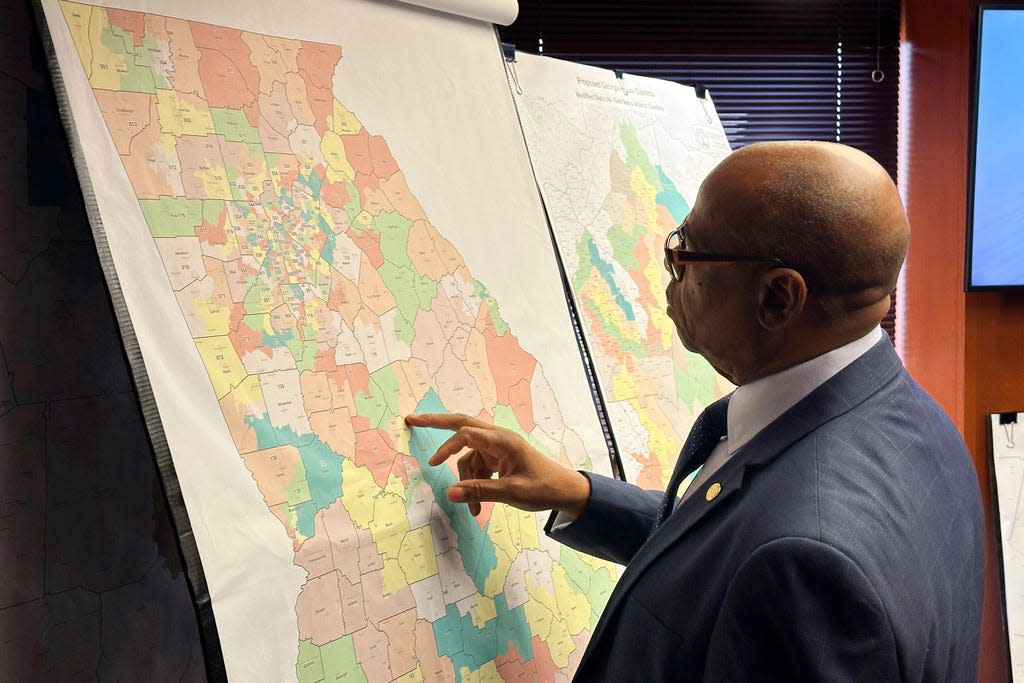Civil rights groups urge judge to throw out 2023 maps in redistricting hearing

Plaintiffs in three voting rights cases opposed Georgia's new Congressional, House and Senate maps in a federal district court hearing Wednesday and urged the court to appoint a special master to redraw the districts.
The maps were created during the 2023 special redistricting session, which redrew district lines from 2021 that illegally diluted the voting power of Black residents in Georgia. Judge Steve C. Jones is expected to issue a ruling in the cases in the next several days.
In an Oct. 26 ruling, Jones had found that the existing congressional, Senate and House maps violated Section 2 of the Voting Rights Act. He ordered the maps be redrawn to include an additional Black-majority congressional district, two additional Black-majority Senate districts, and five additional Black-majority House districts in specific geographic areas, including the southern and western parts of metro Atlanta and parts of Macon-Bibb County. Crucially, he ordered that the new plans could not eliminate “minority opportunity districts” elsewhere in the state.
Under Georgia law, members of the General Assembly are responsible for redrawing district lines. However, plaintiffs in all three cases − Alpha Phi Alpha Fraternity, Inc. v. Raffensperger, Pendergrass v. Raffensperger and Grant v. Raffensperger − claim that state legislators failed to fully remedy the discrimination identified in the 2021 maps, because many of the new Black-majority districts were created on the outside of the vote dilution areas specified in Jones’ ruling.
Plaintiffs urged Jones to appoint a special master to redraw the maps, a tactic that has been used in similar voting rights cases in states like Alabama.
In her opening remarks, lawyer Abha Khanna accused state legislators of “taking a page out of Alabama’s playbook” by refusing to comply with Jones’ orders. Not only do the redrawn maps fail to remedy the Section 2 violations of the Voting Rights Act identified in the maps drawn in 2021, she said, but the proposed districts “independently violate Section 2 anew.”
However, attorney for the state Bryan Tyson refuted the claim that the maps do not comply with the judge's orders, stating "the State has fulfilled its responsibilities" under Section 2 of the Voting Rights Act to create more Black-majority districts. He added that although some congressional, House, and Senate districts had been relocated or eliminated during the redistricting process, the current map "was not a reduction of opportunity" for Black voters as the plaintiffs had claimed.
In order to comply with the orders, the plaintiffs’ lawyers argued, the maps must be redrawn to completely remedy the Section 2 violation, which would include both the creation of new Black-majority and -opportunity districts, and the creation of those districts in the specific areas outlined in Jones’ order. By failing to meaningfully increase opportunities for Black voters in the specific districts where they were disenfranchised, Khanna said “the defendants’ plea for partial credit rings hollow.”
With at least three 2024 elections around the corner, the window of opportunity to introduce new maps is rapidly closing.
According to the Secretary of State’s office, the new district lines must be in place by Jan. 29, 2024 so that counties across Georgia can update their maps and other voter information before the next election. All counties must finish updating their data by Feb. 12 for the maps to be used in the presidential preference primary election on March 12.
Although the judge has not yet released his final ruling, lawyers for both the prosecution and the defense did receive one small hint of clarity: At the beginning of the hearing, Jones specified that the term “minority opportunity district” could be used interchangeable with “Black opportunity district,” as the court was not asked to consider voting rights for other minority groups in any of the three cases.
This article originally appeared on Savannah Morning News: Georgia redistricting: New maps opposed by civil rights groups

